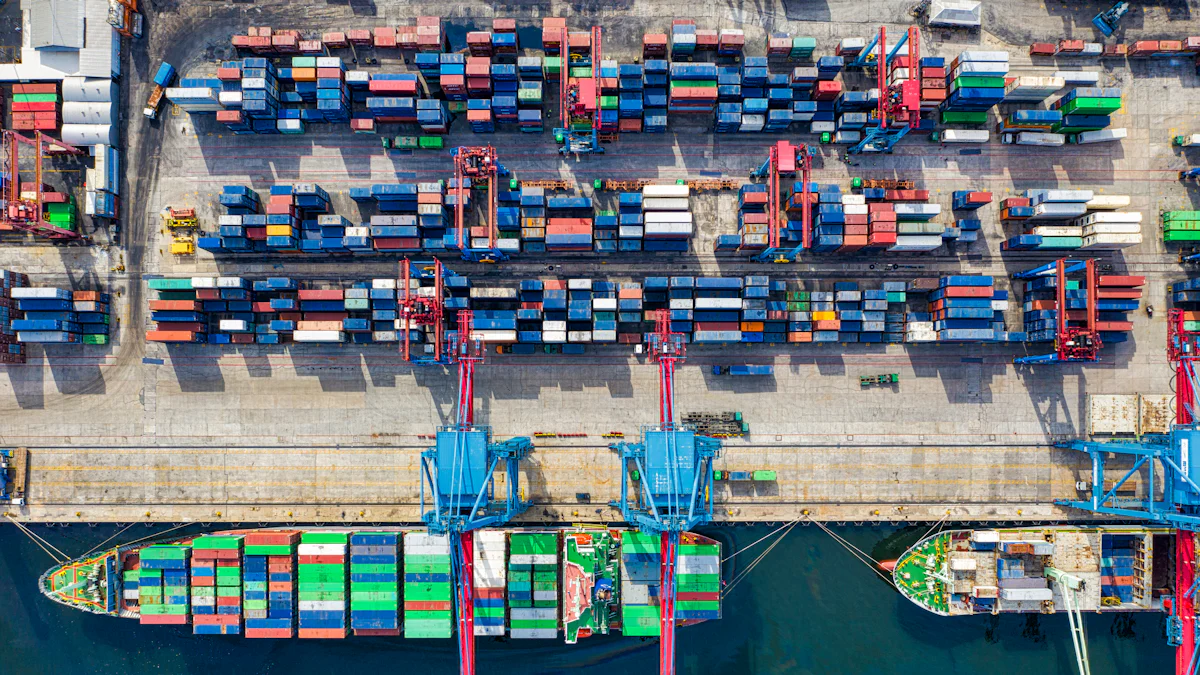2024 Supply Chain Management: Emerging Trends and Innovations

In 2024, the realm of supply chain management stands at a pivotal juncture, brimming with transformative possibilities. The landscape is evolving rapidly, propelled by technological breakthroughs and a steadfast commitment to innovation. This blog embarks on a journey to delve into the depths of emerging trends and cutting-edge innovations that are reshaping the very core of supply chain operations. Stay tuned as we unravel the intricate tapestry of advancements set to redefine the future of supply chains.
Technological Advancements

Artificial Intelligence and Machine Learning have become integral components of supply chain management strategies. By harnessing the power of AI, companies can leverage Predictive Analytics to forecast demand accurately and optimize inventory levels. This proactive approach enables efficient resource allocation and minimizes wastage along the supply chain. Furthermore, Automation in Supply Chain Processes streamlines operations by automating repetitive tasks, enhancing productivity, and reducing human errors.
Internet of Things (IoT) technology plays a pivotal role in revolutionizing supply chain operations. Real-time Tracking and Monitoring through IoT devices provide real-time insights into the movement of goods, enabling precise tracking from manufacturing facilities to end consumers. Moreover, Smart Warehousing powered by IoT facilitates automated inventory management, ensuring optimal stock levels and seamless order fulfillment.
Blockchain Technology offers unparalleled advantages in supply chain management by enhancing Transparency and Security. Through blockchain integration, companies establish an immutable record of transactions across the supply chain network, ensuring data integrity and trust among stakeholders. Additionally, Streamlined Transactions using blockchain streamline payment processes, reducing delays and disputes while enhancing operational efficiency.
Sustainability and Green Supply Chains

Eco-friendly Practices
Driving sustainability through product innovation and collaboration
Implementing sustainable sourcing strategies can significantly reduce the environmental impact of supply chains.
By fostering supplier collaboration and engaging in eco-friendly practices, companies can drive positive change towards a greener future.
Product innovation plays a crucial role in enhancing sustainability within the supply chain, promoting the use of environmentally friendly materials and processes.
Promoting waste reduction strategies for a cleaner environment
Embracing waste reduction strategies is essential to minimize the ecological footprint of supply chain operations.
Implementing efficient recycling programs and optimizing packaging designs can lead to substantial reductions in waste generation.
Companies that prioritize waste reduction contribute to a more sustainable ecosystem while fostering a culture of environmental responsibility.
Circular Economy
Leveraging supply chain for positive sustainability impact
The concept of a circular economy emphasizes the importance of resource efficiency and minimizing waste generation.
By adopting circular economy principles, companies can create value from by-products, promoting a more sustainable approach to production.
Leveraging the supply chain as a catalyst for positive sustainability impact enables organizations to drive meaningful change across industries.
Multiplying sustainability impact through commercial campaigns
Engaging professional customers through commercial campaigns is instrumental in spreading awareness about sustainable practices.
Commercial campaigns that highlight eco-friendly initiatives inspire consumer behavior changes towards more sustainable products.
Enhancing sustainability through strategic marketing efforts not only benefits businesses but also contributes to building a more environmentally conscious society.
Resilience and Risk Management
Diversification of Suppliers
Reducing Dependency on Single Sources
Companies are increasingly focusing on diversifying their supplier base to mitigate risks associated with overreliance on single sources.
By expanding the network of suppliers, organizations can enhance flexibility in sourcing materials and reduce vulnerability to disruptions.
Diversification strategies involve identifying alternative suppliers across different regions to ensure a more resilient and adaptable supply chain.
Building Stronger Supplier Relationships
Strengthening relationships with suppliers is paramount for fostering collaboration and ensuring operational continuity.
Establishing transparent communication channels and mutual trust enables proactive risk management and effective problem-solving.
Cultivating long-term partnerships based on shared goals and values enhances supply chain resilience by promoting agility and responsiveness.
Advanced Risk Assessment Tools
Scenario Planning
Implementing advanced risk assessment tools such as scenario planning allows organizations to anticipate potential disruptions and develop proactive mitigation strategies.
By simulating various scenarios, companies can identify vulnerabilities in their supply chains and formulate contingency plans to address unforeseen challenges.
Scenario planning empowers businesses to make informed decisions based on data-driven insights, enhancing overall risk preparedness.
Real-time Risk Monitoring
Real-time risk monitoring tools provide continuous visibility into supply chain operations, enabling swift identification of emerging risks.
Leveraging real-time data analytics, organizations can detect anomalies or deviations from expected patterns, triggering immediate corrective actions.
Proactive risk monitoring enhances situational awareness and enables timely interventions to prevent disruptions before they escalate.
Customer-Centric Supply Chains
Personalization and Customization
Tailored Products and Services
Companies like Amazon have set a remarkable precedent by leveraging advanced analytics and machine learning algorithms to analyze customer data meticulously. This approach enables them to anticipate the unique needs and preferences of their customers accurately. By tailoring products and services based on these insights, businesses can enhance customer satisfaction and loyalty effectively.
Flexible Delivery Options
Best Buy, a prominent player in the retail industry, exemplifies the essence of adaptability in supply chain operations. Through strategic reinvention, Best Buy has successfully met the evolving demands of the modern consumer landscape. Offering flexible delivery options that cater to varying customer schedules and preferences is pivotal in ensuring a seamless shopping experience.
Enhanced Customer Experience
Real-time Communication
Accenture emphasizes the significance of real-time communication within customer-centric supply chains. Establishing transparent channels for instant feedback and updates fosters stronger relationships with customers. By prioritizing clear communication at every touchpoint, companies can address concerns promptly, build trust, and enhance overall customer satisfaction.
Efficient Returns Management
Deloitte highlights the importance of efficient returns management as a cornerstone of customer-centric supply chains. A streamlined returns process not only boosts customer confidence but also plays a crucial role in shaping brand perception. Implementing hassle-free return policies and processes demonstrates commitment to customer service excellence, ultimately driving repeat business and brand advocacy.
The digital shake-up in supply chain trends for 2024 is imminent, with AI and advanced technologies at the forefront of transformation.
Organizations poised to embrace these shifts can navigate the evolving landscape effectively, as highlighted by KPMG professionals.
Research indicates a surge in impactful trends shaping supply chains, prompting increased budget allocation and broader focus areas.
The convergence of AI, Blockchain, and IoT heralds a more efficient and resilient logistics industry in 2024.
McKinsey's Supply Chain Pulse Survey underscores the revolution in advanced techniques for planning, execution, and risk management.
Government actions in 2024 are set to expand supply chain impacts due to geopolitical frictions and significant elections worldwide.
See Also
5 Key Trends Shaping Future Supply Chain Efficiency
Innovative Logistics Revolutionizing Supply Chain Impact
AI Innovations Unlocking Supply Chain Efficiency
Tomorrow's Logistics Revolutionized by AI Supply Chain
Sustainability Explored: Robotics Trends in Supply Chain Management
